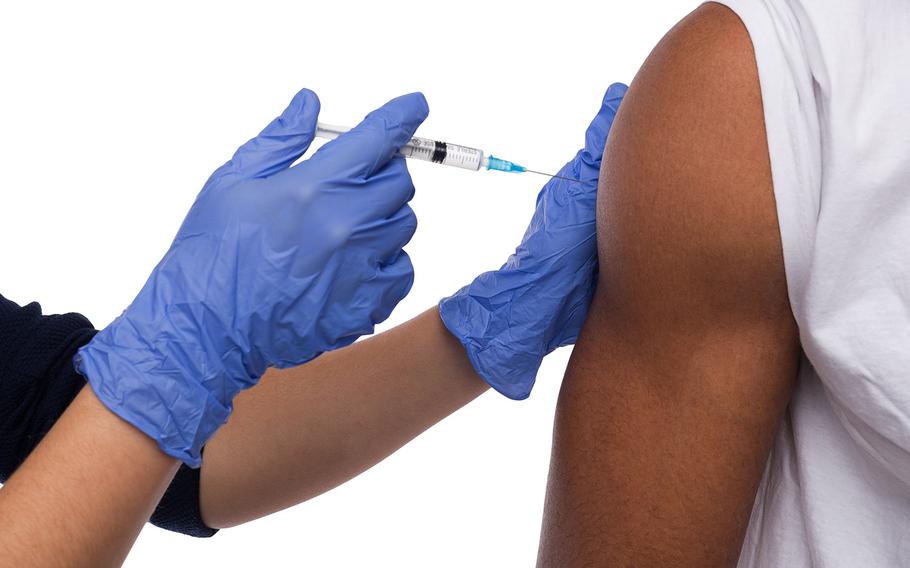
(Getty Images/iStockphoto)
Stars and Stripes is making stories on the coronavirus pandemic available free of charge. See other free reports here. Sign up for our daily coronavirus newsletter here. Please support our journalism with a subscription.
WASHINGTON – Black, Hispanic and Native American veterans will be given priority for receiving coronavirus vaccines once they become available, according to a document published Tuesday by the Department of Veterans Affairs.
Race and ethnicity, as well as veterans’ ages and existing health conditions, will be taken into consideration by the VA when determining who should be vaccinated first. According to VA data, Black, Hispanic and Native American veterans are disproportionately affected by the virus, reflecting trends across the broader population.
Black veterans account for 16% of coronavirus cases across the VA system and 22% of deaths, despite comprising only 12% of the overall population of veterans in the United States. About 77% of the overall veteran population is white, according to VA data. White veterans account for 60% of coronavirus cases and 61% of deaths.
“We’re … considering the disproportionate impact of COVID-19 on racial and ethnicity minority groups as we plan for how to offer COVID-19 vaccines to veterans,” the VA wrote in the document released Tuesday.
Britain became the first nation Tuesday to start a mass vaccination campaign to combat the coronavirus. The country approved a Pfizer vaccine, which is under consideration by the U.S. Food and Drug Administration. The FDA could approve the vaccine as soon as this weekend.
As soon as the FDA authorizes a vaccine, the VA will receive a limited amount, the department said. The agency will first make the vaccines available to its front-line health care staff. The VA operates the largest health care system in the country, with more than 350,000 health care workers. The agency did not specify how many of them would be first in line to be vaccinated.
Vaccines will also go to veterans based on their risk of spreading the virus or becoming severely ill from it. In addition to Black, Hispanic and Native American veterans, those at higher risk include elderly veterans, veterans living in group living facilities or those with health problems, such as cancer, diabetes or heart disease.
As more vaccines become available, the department will administer them to all VA patients who want one, the department said. About 9 million veterans are enrolled in VA health care.
The VA said the vaccine will be free to VA patients and will not require a copayment. The vaccine will be available only at certain VA medical centers to start, and not administered at the department’s community-based outpatient clinics, the document states.
The department submitted a comprehensive vaccination plan to the Centers for Disease Control and Prevention in October, but it will not be publicly released until the FDA approves a vaccine and the CDC issues final recommendations for administering them, the VA said.
“We’re working with the CDC and other federal partners to develop a phased plan that will help us do the most good for the most people,” the document states.
Last week, the Southeast Louisiana Veterans Health Care System sent an email to veterans, stating that the New Orleans VA would be administering vaccines and that veterans needed to call to reserve theirs. When asked about the email, VA Press Secretary Christina Noel said, “Veterans do not need to call to reserve a vaccine.” Information telling veterans to call the New Orleans VA was later removed from the system’s website.
“VA will be releasing its nationwide vaccine distribution plan soon,” Noel said. “Under this plan, veterans and VA employees who indicate a desire to be vaccinated will receive a vaccine once it is authorized and available, following the prioritization guidance from CDC and VA.”
The conversation about vaccines comes as the VA – like the rest of the country – faces the most active coronavirus cases it’s seen at one time.
On Tuesday, the VA reported nearly 16,000 active cases and 5,380 deaths among VA patients, as well as 77 employee deaths.
The VA hospital in Cleveland, Ohio, tallied the most cases, with 507. On Tuesday, it became one of six VA hospitals that have reported 100 or more coronavirus deaths at their facilities, joining East Orange, New Jersey; New York City; Harlingen, Texas; Minneapolis; and Columbia, South Carolina.
The VA’s data on cases and deaths does not include all veterans in the United States, nor does it include the hundreds of deaths that have occurred at state-run veterans’ homes.
Wentling.nikki@stripes.com Twitter: @nikkiwentling